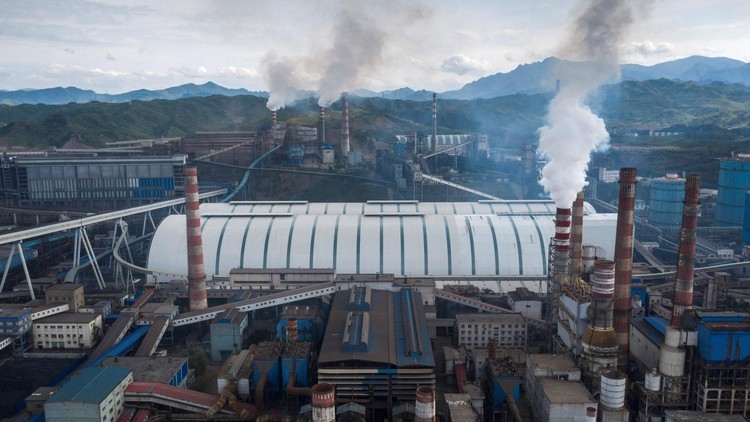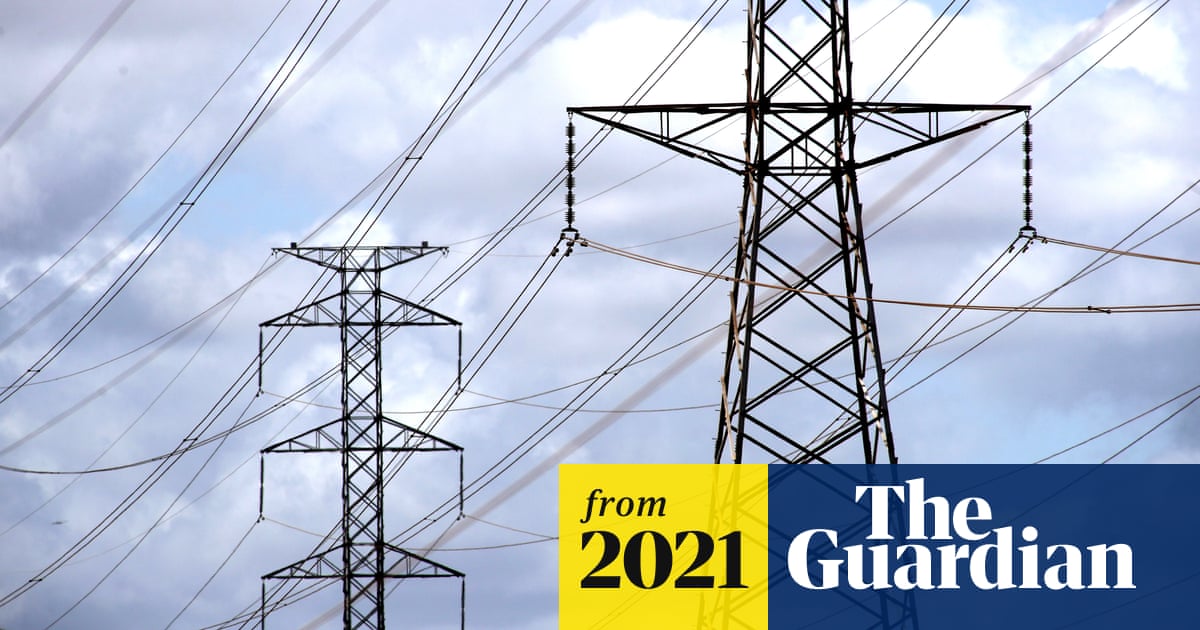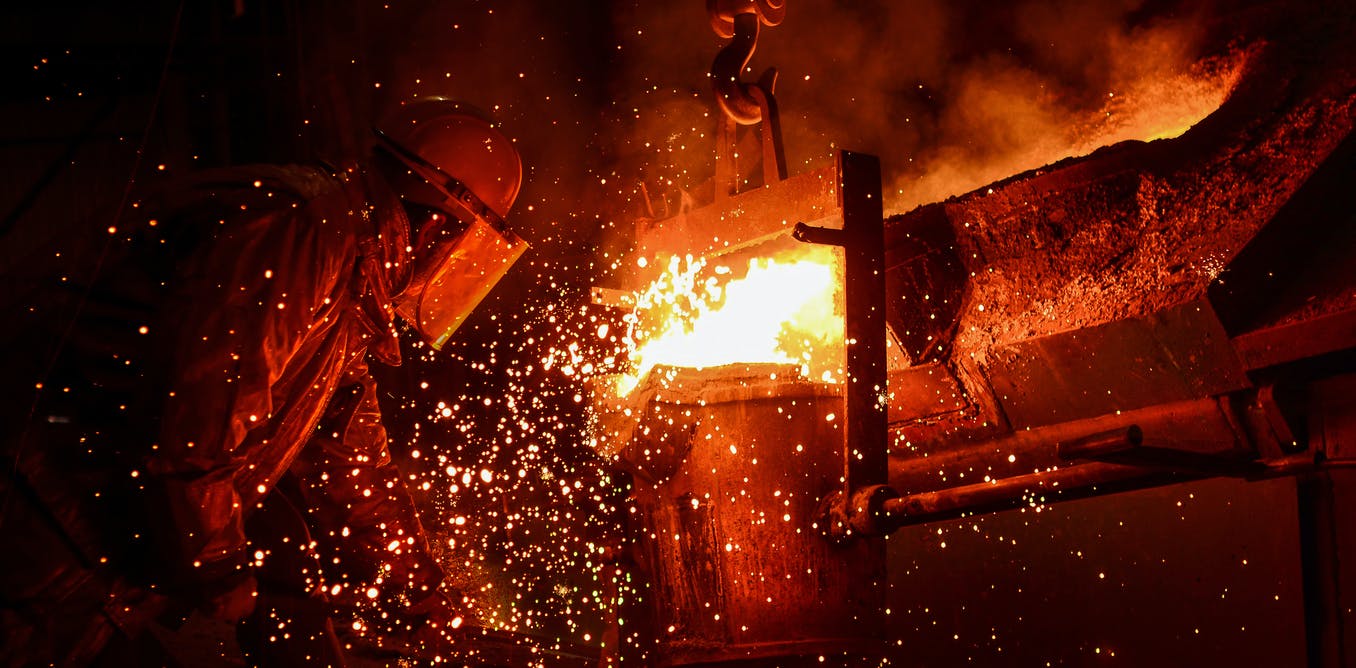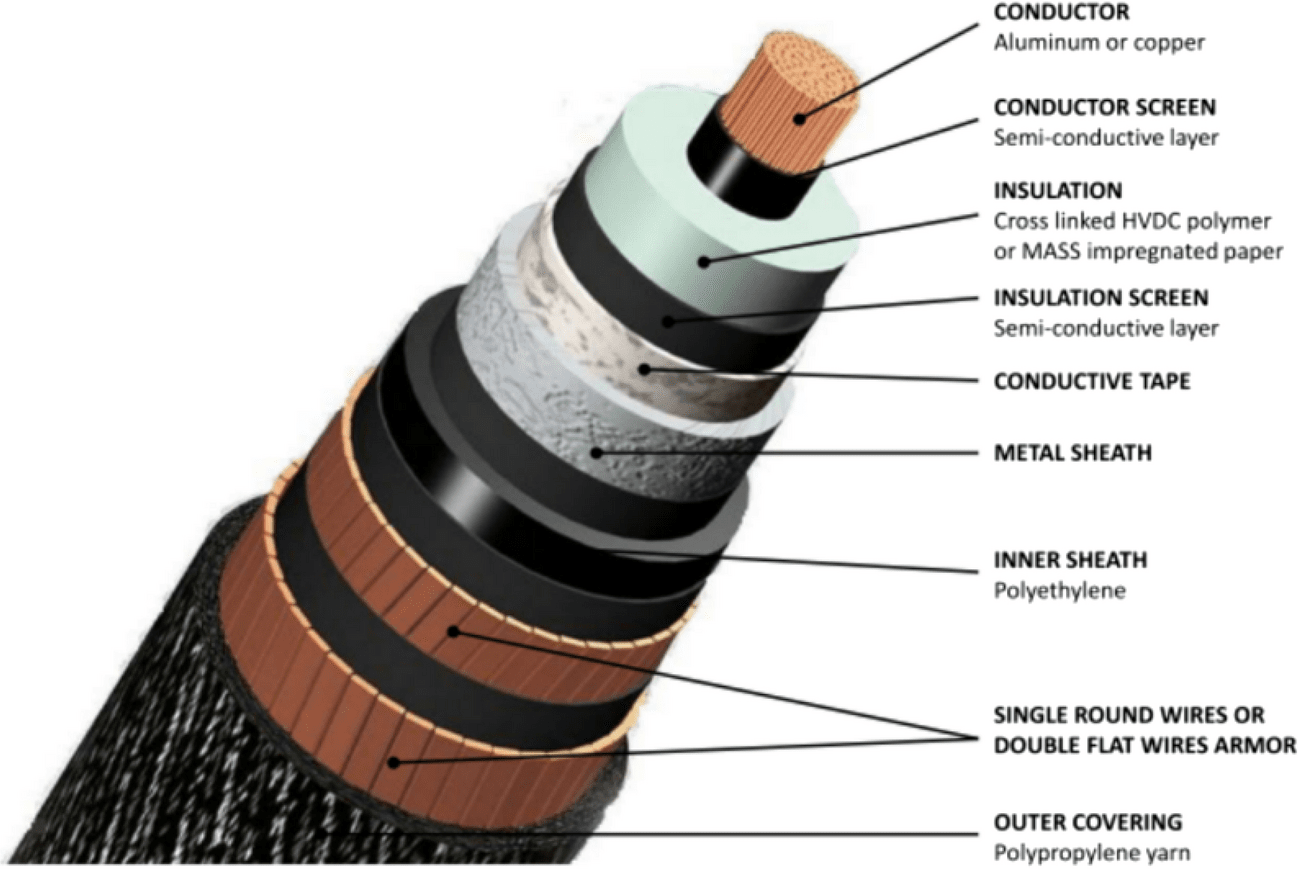Navigation
Install the app
How to install the app on iOS
Follow along with the video below to see how to install our site as a web app on your home screen.
Note: This feature may not be available in some browsers.
More options
You are using an out of date browser. It may not display this or other websites correctly.
You should upgrade or use an alternative browser.
You should upgrade or use an alternative browser.
The war against renewable energy
- Thread starter Upton Sinclair
- Start date
- Tagged users None
China’s new $81 billion blow to Australia — news.com.au
China has revealed a new plan that could send Australia into a “wintry period” by wiping more than $81 billion from our economy.
Chinese threatening to take down our iron ore exports
This would be an economic calamity for our nation.
The way out? Clean green steel made from hydrogen sourced from solar / wind. We could become the eu’s sole steel supplier
Do we have a government thats looking ahead to incentivise this?
* no
Gough
Moderator
- Sep 29, 2006
- 71,979
- 133,621
- AFL Club
- Hawthorn
- Moderator
- #4,703
All good mate, the gas led recovery will see us right.
China’s new $81 billion blow to Australia — news.com.au
China has revealed a new plan that could send Australia into a “wintry period” by wiping more than $81 billion from our economy.apple.news
Chinese threatening to take down our iron ore exports
This would be an economic calamity for our nation.
The way out? Clean green steel made from hydrogen sourced from solar / wind. We could become the eu’s sole steel supplier
Do we have a government thats looking ahead to incentivise this?
**** no

Morrison government’s $600m gas power plant at Kurri Kurri not needed and won’t cover costs, analysts say
Little demand is likely for the ‘peaking’ plant before 2030, calling into question the Coalition’s claim it will reduce electricity prices
Taylor
Community Leader
- Moderator
- #4,704
What can Australia do that can't be done in a market that can hire people for slave to cheap rates per day?
I agree that we should be turning the iron ore into steel here (even if purely for the production capacity locally should the world close down), we have both the iron and the coal to do that, but given it's cheaper to ship it by boat overseas, process it and then ship it back to us - we have a long way to go on reducing the cost of business.
And almost all of that is wages.
Which is where the government would need to make it legal to pay people less than the award rate to make the enterprise cost effective. That's never going to happen.
I agree that we should be turning the iron ore into steel here (even if purely for the production capacity locally should the world close down), we have both the iron and the coal to do that, but given it's cheaper to ship it by boat overseas, process it and then ship it back to us - we have a long way to go on reducing the cost of business.
And almost all of that is wages.
Which is where the government would need to make it legal to pay people less than the award rate to make the enterprise cost effective. That's never going to happen.
Ned_Flanders
Make me an Admin!
- Aug 22, 2009
- 77,158
- 142,364
- AFL Club
- Richmond
- Other Teams
- 76'ers
What can Australia do that can't be done in a market that can hire people for slave to cheap rates per day?
I agree that we should be turning the iron ore into steel here (even if purely for the production capacity locally should the world close down), we have both the iron and the coal to do that, but given it's cheaper to ship it by boat overseas, process it and then ship it back to us - we have a long way to go on reducing the cost of business.
And almost all of that is wages.
Which is where the government would need to make it legal to pay people less than the award rate to make the enterprise cost effective. That's never going to happen.
its not wages. its economies of scale. the new furnaces and plant that you use in steel production are so expensive you need to shift massive volumes through that to make it economically viable.
remember Japan, Korea, the USA, and Germany are all in the top 10 steel producing nations, and none of these could be considered low wage nations. They are nations with massive demand for steel that can justify developing this high cost infrastructure.
Chief
~ Shmalpha ~
- Admin
- #4,706
No value adding at all.Which in the end we only have ourselves to blame for.
Our exporteconomy is one of the most unsophisticated in the world. Dig sh*t up, feed and entertain tourists, teach students… and not much else.
17-18 figures:
View attachment 1151375
We have an opportunity to be the worlds largest energy exporter though - we have tens of millions of sq km in land noone wants so we can build a million acres of renewable generation - pity we just dont have someone bribingbthe govt in power to help it 1/4 as much as they do their current donors…
- Jul 8, 2017
- 21,803
- 64,231
- AFL Club
- Richmond
John Hewson has been banging on about this for a while. Australia is in a prime position to create green steel with wind/solar. We have 1000s km of dry hot coastline. The green hydrogen producing plants and steel foundries could be built on the coast near the iron ore mines. Europe has already stated they will in future only be purchasing green product including steel.
China’s new $81 billion blow to Australia — news.com.au
China has revealed a new plan that could send Australia into a “wintry period” by wiping more than $81 billion from our economy.apple.news
Chinese threatening to take down our iron ore exports
This would be an economic calamity for our nation.
The way out? Clean green steel made from hydrogen sourced from solar / wind. We could become the eu’s sole steel supplier
Do we have a government thats looking ahead to incentivise this?
**** no
It would however require a forward thinking government to kick start it, something we do not have.
Taylor
Community Leader
- Moderator
- #4,709
Fair point, although I would mention that it's really just Japan and the USA that would have arguably higher wages of significance in that top ten globally since the overwhelming majority if the slave labor of China (the greatest contributor is over 1.7x the entire rest of the list combined), and from what I'm reading about Nippon, JFE and Kobe.. they aren't doing so well.its not wages. its economies of scale. the new furnaces and plant that you use in steel production are so expensive you need to shift massive volumes through that to make it economically viable.
remember Japan, Korea, the USA, and Germany are all in the top 10 steel producing nations, and none of these could be considered low wage nations. They are nations with massive demand for steel that can justify developing this high cost infrastructure.
The top ten producers off the 2019 data (global production):
China (53.3%) - average salary $12,392 ($15,985 AUD, $307pw)
India (5.95%)
Japan (5.31%)
USA (4.7%) - average salary $64,591 ($83,322 AUD), 20 hour a week average is $450 AUD
Russia (3.83%)
S. Korea (3.82%)
Germany (2.12%)
Turkey (1.8%)
Brazil (1.72%)
Iran (1.71%)
I think it's fair to say that Australia wouldn't be able to compete with international options given the cost of production here. A specific example to point to might be car manufacturing, without significant automation of the steel production line (which I'm not sure is possible) we can't compete with the cost of overseas production and import. That example definitely had a magnitude of scale element to it working against the local production.
If we could set up a little independent legal entity in the North of either WA, QLD or NT that could operate with heavy subsidies on infrastructure construction expenses and then keep operational costs at the international average (which I'd estimate is about 33% of current award rates per tonne of steel produced) then we can compete.
But I think it should be looked at how nations are looking at it. We need to be able to produce steel to defend ourselves. We don't have the ability to produce the means to defend ourselves now.
Taylor
Community Leader
- Moderator
- #4,710
What would you like the government to do?No value adding at all.
We have an opportunity to be the worlds largest energy exporter though - we have tens of millions of sq km in land noone wants so we can build a million acres of renewable generation - pity we just dont have someone bribingbthe govt in power to help it 1/4 as much as they do their current donors…
We, being the Australian government, could build, operate and retain ownership of a significant solar power generation station in the middle of the nation.
Transmission of that power would be problematic, I think running the numbers on a cable from Australia to Asia requires the entire cable production of the planet for half a decade to make it happen.
So is the solution a stable power capsule that can be shipped? An energy dense export produced here to be shipped around the world to have zero emissions.
The only one I can think of currently is uranium, we can refine that and ship it out for clean power worldwide. We have the better part of half the world's known stockpiles of it.
Ned_Flanders
Make me an Admin!
- Aug 22, 2009
- 77,158
- 142,364
- AFL Club
- Richmond
- Other Teams
- 76'ers
Fair point, although I would mention that it's really just Japan and the USA that would have arguably higher wages of significance in that top ten globally since the overwhelming majority if the slave labor of China (the greatest contributor is over 1.7x the entire rest of the list combined), and from what I'm reading about Nippon, JFE and Kobe.. they aren't doing so well.
The top ten producers off the 2019 data (global production):
China (53.3%) - average salary $12,392 ($15,985 AUD, $307pw)
India (5.95%)
Japan (5.31%)
USA (4.7%) - average salary $64,591 ($83,322 AUD), 20 hour a week average is $450 AUD
Russia (3.83%)
S. Korea (3.82%)
Germany (2.12%)
Turkey (1.8%)
Brazil (1.72%)
Iran (1.71%)
I think it's fair to say that Australia wouldn't be able to compete with international options given the cost of production here. A specific example to point to might be car manufacturing, without significant automation of the steel production line (which I'm not sure is possible) we can't compete with the cost of overseas production and import. That example definitely had a magnitude of scale element to it working against the local production.
If we could set up a little independent legal entity in the North of either WA, QLD or NT that could operate with heavy subsidies on infrastructure construction expenses and then keep operational costs at the international average (which I'd estimate is about 33% of current award rates per tonne of steel produced) then we can compete.
But I think it should be looked at how nations are looking at it. We need to be able to produce steel to defend ourselves. We don't have the ability to produce the means to defend ourselves now.
you cant use average wage data. it only works if the proportion of steel workers as a percentage of the workforce is representative across them all.
steel making isnt what you see in movies any more, with lots of big guys pouring molten metal. A lot of it is automated, inc in china.
FWIW australia lost its steel industry decades ago to the likes of Taiwan and Korea, and again it was due to volume. We didnt have the volume to justify the expensive modernizations that they did.
a bigger issue actually is the cost of power (than labour). steel making requires high volumes of energy, and nations with expensive power costs are at a disadvantage
Taylor
Community Leader
- Moderator
- #4,712
What would you think of a nuclear power plant supplying the power needs to a local steel production industry?you cant use average wage data. it only works if the proportion of steel workers as a percentage of the workforce is representative across them all.
steel making isnt what you see in movies any more, with lots of big guys pouring molten metal. A lot of it is automated, inc in china.
FWIW australia lost its steel industry decades ago to the likes of Taiwan and Korea, and again it was due to volume. We didnt have the volume to justify the expensive modernizations that they did.
a bigger issue actually is the cost of power (than labour). steel making requires high volumes of energy, and nations with expensive power costs are at a disadvantage
Do you think steel producers locally are misleading when they claim that the cost of labor in Australia is too high to compete globally?
Ned_Flanders
Make me an Admin!
- Aug 22, 2009
- 77,158
- 142,364
- AFL Club
- Richmond
- Other Teams
- 76'ers
What would you think of a nuclear power plant supplying the power needs to a local steel production industry?
Do you think steel producers locally are misleading when they claim that the cost of labor in Australia is too high to compete globally?
1) I think nuke generators cost many billions and take decades to build. you dont get them for cheap juice
2) i think they are just looking to squeeze the unions. I havent tested this with steel (but have with other commodities), and often even if labour is nuked our unit prices are still well above global norms. volume is the thing that hurts us
1) I think nuke generators cost many billions and take decades to build. you dont get them for cheap juice
2) i think they are just looking to squeeze the unions. I havent tested this with steel (but have with other commodities), and often even if labour is nuked our unit prices are still well above global norms. volume is the thing that hurts us
Here's a good summary of the approach to green steel - was on a webinar that covered this yesterday. It's still a way off but that doesn't mean we shouldn't start:

‘Green steel’ is hailed as the next big thing in Australian industry. Here’s what the hype is all about
Australia’s abundant wind and solar resources mean we’re well placed to produce the hydrogen a green steel industry needs. But there are technical and economic challenges ahead.
 theconversation.com
theconversation.com
Taylor
Community Leader
- Moderator
- #4,716
Is this a fair equivalency?We had that with nuclear power but Labor shut it down.
Now we have it with renewables but LNP is shutting it down.
There's an actual ban on nuclear. There just isn't an outpouring of public money for renewables research, development or implementation (if you ignore all the solar rebates etc)
- Sep 20, 2010
- 1,371
- 3,681
- AFL Club
- Fremantle
What would you like the government to do?
We, being the Australian government, could build, operate and retain ownership of a significant solar power generation station in the middle of the nation.
Transmission of that power would be problematic, I think running the numbers on a cable from Australia to Asia requires the entire cable production of the planet for half a decade to make it happen.
So is the solution a stable power capsule that can be shipped? An energy dense export produced here to be shipped around the world to have zero emissions.
The only one I can think of currently is uranium, we can refine that and ship it out for clean power worldwide. We have the better part of half the world's known stockpiles of it.
Got anything to back up those calculations for a cable to Asia because that doesnt sound right. That guy from Atlassian and Forrest are looking at building a high voltage DC cable to Singapore from the NT. These HV DC cables exist all over the world and can go long distances and are more efficient than traditional AC transmission.
So is the solution a stable power capsule that can be shipped? An energy dense export produced here to be shipped around the world to have zero emissions.
The only one I can think of currently is uranium, we can refine that and ship it out for clean power worldwide. We have the better part of half the world's known stockpiles of it.
Ammonia produced from Green Hydrogen looks like it would tick all those boxes. I've got no problems with uranium but it just doesnt stack up financially at the moment. Pretty much every new reactor goes over time and over budget and we cant even work out a place to store radioactive medical waste let alone the waste that comes from a power plant.
Taylor
Community Leader
- Moderator
- #4,719
Got anything to back up those calculations for a cable to Asia because that doesnt sound right. That guy from Atlassian and Forrest are looking at building a high voltage DC cable to Singapore from the NT. These HV DC cables exist all over the world and can go long distances and are more efficient than traditional AC transmission.
They are, look at their timeline.
- Sep 20, 2010
- 1,371
- 3,681
- AFL Club
- Fremantle
Can you show me? All I see is they plan to begin construction in 2023 and have it providing power to Singapore by 2027 - https://suncable.sg/They are, look at their timeline.
I dont see anything about requiring " the entire cable production of the planet for half a decade"
Taylor
Community Leader
- Moderator
- #4,721
Can you show me? All I see is they plan to begin construction in 2023 and have it providing power to Singapore by 2027 - https://suncable.sg/
I dont see anything about requiring " the entire cable production of the planet for half a decade"

Subsea cable key challenges of an intercontinental power link: case study of Australia–Singapore interconnector - Energy Transitions
The high potential for renewable energy generation in Australia, in particular solar and wind, and the high carbon content of Southeast Asian electricity and projected demand growth create favourable conditions for a HVDC power link between Australian and Southeast Asia. Such an interconnector...
The key point from this is that of the seven places that can produce these HVDC cables, assuming no other commitments, each can service approximately 500km a year with 6400km of connection required.
This study estimates that half to 5/7ths of the total global production will need to be dedicated to this project to have the cable in place within four years.
...I'm thinking the electrical engineer who told me this was using a bit of hyperbole.
But let's not be kidding ourselves that to build this in two years will take more than the ability of the planet to do it, currently, and suppliers won't want to lock themselves into a single contract for that term to the exclusion of other sales, ie. there is an existing demand that needs to be met.
Has Singapore approved the project yet?
Ok imagine if once we set up this renewables to hydrogen project our energy costs from then on were cheaper than our competitions green energy costs.What can Australia do that can't be done in a market that can hire people for slave to cheap rates per day?
I agree that we should be turning the iron ore into steel here (even if purely for the production capacity locally should the world close down), we have both the iron and the coal to do that, but given it's cheaper to ship it by boat overseas, process it and then ship it back to us - we have a long way to go on reducing the cost of business.
And almost all of that is wages.
Which is where the government would need to make it legal to pay people less than the award rate to make the enterprise cost effective. That's never going to happen.
In a largely automated factory where labour costs are a low percentage of costs - making steel for a captive massive market with huge economies of scale.
Or dont imagine it
Sit there imagining coal whilst china buys less and less steel off us, goes green itself and doesnt even buy the coal off us and we are broke
- Sep 20, 2010
- 1,371
- 3,681
- AFL Club
- Fremantle

Subsea cable key challenges of an intercontinental power link: case study of Australia–Singapore interconnector - Energy Transitions
The high potential for renewable energy generation in Australia, in particular solar and wind, and the high carbon content of Southeast Asian electricity and projected demand growth create favourable conditions for a HVDC power link between Australian and Southeast Asia. Such an interconnector...link.springer.com
The key point from this is that of the seven places that can produce these HVDC cables, assuming no other commitments, each can service approximately 500km a year with 6400km of connection required.
This study estimates that half to 5/7ths of the total global production will need to be dedicated to this project to have the cable in place within four years.
...I'm thinking the electrical engineer who told me this was using a bit of hyperbole.
But let's not be kidding ourselves that to build this in two years will take more than the ability of the planet to do it, currently, and suppliers won't want to lock themselves into a single contract for that term to the exclusion of other sales, ie. there is an existing demand that needs to be met.
Has Singapore approved the project yet?
Thanks for providing that link - it was an interesting read and opened my eyes to the challenges involved. It's an ambitious project but isnt that what we need at the moment? A bit of vision and ambition? And as that paper concludes, its technically feasible. Whether it makes money or not is another question. But those guys are loaded anyway.
And yes, it does sound like you mate was exaggerating a bit with it taking up all global cable production for 5 years but hopefully HV DC cable production capacity will increase by then.
Federal Government suddenly concerned about environment:

 reneweconomy.com.au
reneweconomy.com.au

“Clearly unacceptable:” Morrison government blocks massive Pilbara renewable hydrogen hub
Plans to build a massive renewable hydrogen hub including up to 26GW of wind and solar in WA Pilbara rejected by federal Morrison government on environmental grounds.
Chief
~ Shmalpha ~
- Admin
- #4,725
Who forgot to pay the bribe?Federal Government suddenly concerned about environment:

“Clearly unacceptable:” Morrison government blocks massive Pilbara renewable hydrogen hub
Plans to build a massive renewable hydrogen hub including up to 26GW of wind and solar in WA Pilbara rejected by federal Morrison government on environmental grounds.reneweconomy.com.au
Similar threads
- Replies
- 785
- Views
- 23K
- Replies
- 9
- Views
- 611
- Replies
- 135
- Views
- 6K






